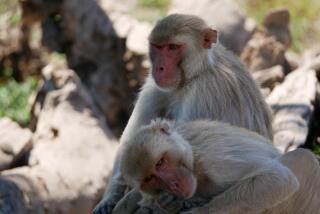DNA Tweak Turns Vole Mates Into Soul Mates
- Share via
Scientists working with a rat-like animal called a vole have found that promiscuous males can be reprogrammed into monogamous partners by introducing a single gene into a specific part of their brains.
Once they have been converted, the voles hang around the family nests and even huddle with their female partners after sex.
The results suggest that “a mutation in a single gene can have a profound impact on complex social behavior,” said Larry Young, a neuroscientist at Emory University who reports the results in the current issue of the journal Nature.
The research, Young said, could help shed light on monogamy -- a rare social behavior -- and hints that perhaps specific genes could play a role in human relationships.
But don’t expect gene therapy for human swingers.
“This is not something that we should be playing around with,” Young said.
Voles, found in the wild throughout much of North America, have been particularly useful in studying monogamy, which in biology refers more to the complicated social bonds based on partnership than to absolute sexual fidelity.
One variety -- the prairie vole (Microtus ochrogaster) -- pairs up like humans. Males may occasionally stray from their lifelong partners, but they inevitably return to their nests and help care for litter after litter.
In contrast, meadow voles (Microtus pennsylvanicus), a similar but separate species, prowl their habitat for any available female and show no interest in staying in touch.
The difference, it turns out, is a receptor for the hormone vasopressin. Prairie voles have such receptors in a part of the brain known as the ventral pallidum. Meadow voles do not.
To make promiscuous male meadow voles behave like their loyal prairie cousins, the scientists used a common gene therapy technique. They injected the animals’ forebrains with a harmless virus carrying the gene responsible for expressing the receptors.
Each vole, a young virgin that had never before encountered a member of the opposite sex, then spent 24 hours caged with a female that had been injected with estrogen. They mated.
Each male was then placed in his own plexiglass complex. Leashed in one room was his original partner. Down the hall was another female primed for mating.
The 11 genetically altered voles overwhelmingly stuck to their first partner. The couples mated. They then nestled together and exchanged licks.
The voles in the control group did not consistently seek out their original partners.
What looks like romance, the researchers suggested, may be the product of two neural pathways in the pleasure center of the brain.
There is the gratification of sex, which depends on dopamine receptors in a part of the brain known as the nucleus accumbens. But nearby, in the ventral pallidum, are the vasopressin receptors, which allow for individual recognition.
The result: sexual preference for a specific partner.
Fewer than 5% of mammals are monogamous. Monogamy has rarely suited males when it comes to propagating their own genes. More often it has been in their interest to reproduce with as many females as possible.
In some cases, however, monogamy makes sense. For example, if predators are particularly rampant, males are better off staying around their homes to protect their offspring.
Scientists believe that monogamy evolved from polygamy. The results released Wednesday suggested that flipping one genetic switch might have been enough to spur a massive social reordering, Young said.
But Evan Balaban, a neuroscientist at McGill University in Montreal, questioned whether a single gene could cause such a dramatic change. He said that in the wild, many genes were likely involved in the expression of vasopressin receptors.
In female voles, it is another hormone, oxytocin, that appears to be involved in pair bonding.
The same hormone systems also operate in all other mammals, including humans.
The genes that control expression of vasopressin receptors vary widely in healthy men.
Human relationships, of course, are complicated, and culture and socialization probably matter as much as biology. Even so, Young suggested that genetic differences could help explain why some men have trouble maintaining relationships.
Gene E. Robinson, head of neuroscience at the University of Illinois at Urbana-Champaign, cautioned against extrapolating the results to humans. “The behavior of animals is much simpler than the behavior of humans,” he said.
Even if the findings could lead to an elixir for fidelity, a single gene would not solve every problem at home. The genetically altered meadow voles spent more time with their partners, but unlike their naturally faithful prairie relatives, they did not help care for the pups.
That, Young said, probably depends on other neural pathways.






